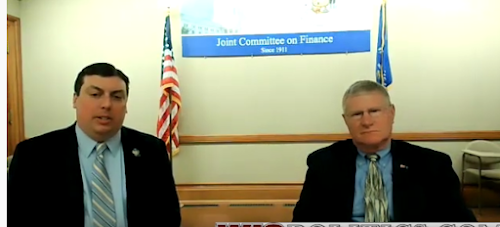Governor Evers put out his budget, but of course, that has to get through the gerrymandered GOP Legislature. Which makes
a recent event with new Joint Finance co-chairs Mark Born and Howard Marklein worth checking out, as it may give an idea as to what could (and won't) get through.
In the
Wispolitics summary of that event, there might be a few items that the GOPs on JFC will go along with (although in a watered-down fashion), but many of Evers' central changes won't get passed into law. At least not in the next 4 months of budget deliberations.
[Born and Marklein] signaled support for the guv’s proposals to expand mental health care, bring high-speed internet to rural communities, increase funding for agriculture programs and increase public school spending, but they don’t approve of some of the broader proposals such as expanding Medicaid and legalizing marijuana.
The pair also said they strongly oppose:
*$15/hr. minimum wage increase;
*Allowing local municipalities to raise sales taxes;
*Allowing the UW System to receive loans;
*$1.6 billion K-12 school budget.
Not overly surprising, although self-centered and disappointing, because WisGOPs care more about stirring up resentment against the UW and bigger cities than actually doing something that would help the overall state economy. The sales tax item is especially infuriating because
in another article covering the press event, Marklein says that Lafayette County and "[his] townships" would not benefit from a sales tax.
But what Marklein doesn't mention that he also "represents" much of Sauk County, which has a lot of places like this.
In fact, Marklein and other Republicans had no problem with allowing
Lake Delton and Wisconsin Dells to raise their own sales taxes after an approved referendum in 2014, but God forbid more places be allowed the same opportunity to keep more of the money they generate.
And the reasoning Marklein gives behind not wanting to expand Medicaid is another type of circular BS.
Marklein also said Medicaid expansion isn’t as big of a priority in Wisconsin as it is in other states because of existing state-sponsored health care offerings.
“I believe we do a great job in this state of covering our residents and providing opportunities for them to be covered in insurance,” Marklein said, adding that while Medicaid expansion is one method to improve coverage, “the problem in our state is not nearly as significant as what it is in some other states.”
Most of those "opportunities for them to be in insurance"
is through the Obamacare exchanges, which Republicans spent much of the 2010s complaining about. Using those same exchanges as a crutch to avoid Medicaid expansion is quite the way to dodge a reason to save state taxpayers hundreds of millions of dollars while expanding services.
That being said, I think there is plenty that can be improved in this budget. I wish the sales tax increase had been tied in to lowering/limiting property taxes (it's done in a more roundabout way in Evers' budget, where higher state aids limit the increases). We have a system of funding local government that doesn't work well, and the budget would have been a great opportunity for Evers to present himself as a "reformer" and force GOPs to respond. Especially since many Wisconsinites
can't write off their property taxes on the Federal tax returns due to 2017's GOP Tax Scam.
Another complaint I would have is that the added spending combined with tax hikes gives an easy target for Republicans to go after while not having to deal with the policy ideas that Evers is promoting that most Wisconsinites agree with. While the Manufacturing and Agreiculture giveaway is absurd and should go away, it's harder to ask for it in a time when Wisconsin's corporate taxes are rising, largely due to more businesses re-classifying as corporations because the Tax Scam makes it more worthwhile at the Federal level.
But let's face it, a lot of this is Evers throwing down a marker of
what is possible if Democrats ran the state. We absolutely can expand our services, try to level inequities and cut taxes for the lower and middle classes, if we choose to. We could expand Medicaid, if we choose to. We could have a fairer tax system, if we choose to. Etc.
However, a lot of these changes won't happen as long as Republicans run the Legislature, and so we're only going to get so much adjusted in a time when we have the resources to make for change, and when change is needed. The key is hammering on the choices that are made as the budget goes through the Legislature, and to identify the opportunities as they become apparent.



No comments:
Post a Comment